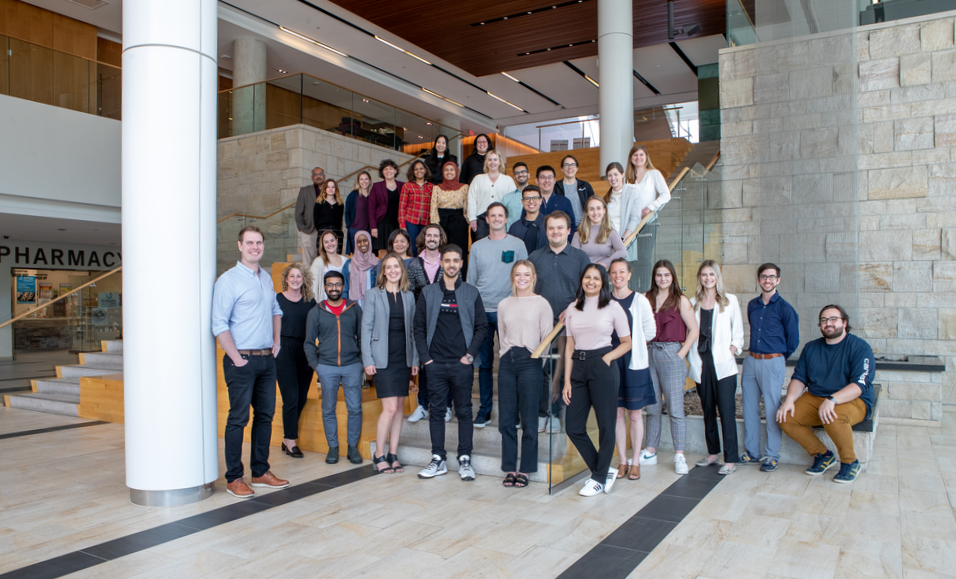About the Program
Over the past twenty years there has been growing interest by health science educators in graduate programs that pertain to clinical teaching and scholarship and prepare individuals for leadership roles in a faculty of health science academic environment; however, there have been few opportunities to pursue such studies in Canada.
This online inter-professional master’s program leads to the degree Master of Science in Health Science Education for health science clinical educators (physicians, nurses, occupational therapists, physiotherapists, midwives, physician assistants, etc.), and others who teach in health sciences education, research, and academic clinical care, and who lead in health care settings.
The program builds on the internationally renowned signature pedagogies in health science education developed and pioneered at McMaster University’s Faculty of Health Sciences, (Problem-Based Learning, Self-Directed Learning). The PBL teaching and learning methodology that uses an inquiry approach focuses on student-driven small group learning to foster critical thinking, higher retention, and stronger cognitive competencies including coping with uncertainty and communication skills. The program will act as a strategy to enhance collaborative, patient-centred care by engaging learners in inter- and intra-professional practice; to shape the future of education in health science professional programs; and to foster health professions leadership and succession planning.
For more information about how to apply, please visit our Future Students page
Overall Objectives
-
Integrate graduate level training in theory-based principles of pedagogy, assessment and evaluation, inter-professionalism, leadership, and McMaster’s Faculty of Health Science signature curriculum (e.g. concept based learning) in course content, learning strategies and activities.
-
Enable knowledge, academic scholarship and research pertaining to health science education.
-
Enhance preparedness for advanced professional and inter-professional academic roles including educational leadership roles across the health sciences.
-
Enable the application of evidence-based education in the fields and communities of our students.
-
Engage learners with interactive learning strategies in classroom (residency) and online course-based learning.
-
Enable learners to utilize information technology for classroom and online learning, communication, and assessment.
-
Prepare students for further education, e.g. PhD, by providing a thesis-based option.
Program Structure
The Masters of Science in Health Science Education (HSED) is an online inter-professional program designed for health professionals and non-clinicians who teach or would like to engage in scholarship or research in health professions education. Our core faculty includes a range of interdisciplinary PhD and Masters prepared health professionals in order to facilitate the development of health profession educators. This allows for the understanding and application of theories of health science education, whether in an academic or clinical setting. All aspects of the program highlight the overt inter-professional culture and engagement of peer feedback and support that exist in the structure and content of the HSED program.
For important sessional dates, please visit the Graduate Calendar.
Information Box Group

Student Population
The HSED Program is designed primarily for clinicians in a health sciences field that wish to strengthen their abilities as educators in their area of expertise and to develop proficiency in education scholarship or research. Although the majority of students will have already completed training in health professions related discipline (e.g. medicine, nursing, midwifery, paramedic, veterinary, dental hygienist), direct entrance is permitted to undergraduate non-clinicians that aspire to be scholars in the field of health sciences education.

Study Period
The HSED Program caters directly to full-time employed health care professionals who are seeking MSc level education but require a flexible and accessible learning schedule to complete the program at their own pace. Students are given the option to complete the program in two years in the full-time option. The program also has the flexibility to allow those students who wish to complete the program part-time, which, in conjunction with the accessibility and availability of the online teaching modules allows for the completion of a MSc. level program without sacrificing valuable and profitable time, all the while maintaining a rich and steady learning experience. Part-time students are allowed to take a maximum of 9 units each academic year, such that they complete their studies in 3 to 5 years.
Program Structure Schematics
Program Outline
All students enrolled are required to complete two annual on-campus, in-person residency weeks during their enrollment in the program. Students must also complete 2 core courses and either 3 or 1 elective courses, depending on if they are enrolled in the course-based or thesis-based option. In order to graduate students must also submit either a capstone portfolio or thesis paper for review.
Program Delivery
The program will be highly accessible through blended delivery of online and in-class formats. The Master of Science in Health Science Education program offers online courses in learning and curriculum, simulation/technical & non-technical skills, online learning, educational leadership, assessment and evaluation, and research methods. In addition, two mandatory in-person residency periods must be completed. The program offers students two completion pathways: a course-based option which is offered in online format through part-time studies (full time may be considered with special permission), or a thesis-based option offered in either part-time or full-time studies. Non-health practitioners will only be considered for the full-time, thesis stream.
Residency Periods
Mandatory residency periods (HS EDUC 700 & HS EDUC 707) are held concurrently in June before the start of every academic year and every student in the HSED Program must complete 2 residency weeks throughout their studies.
- Students must attend the 5-day HS EDUC 700 residency period prior to beginning the program.
- It provides an overview of the program and courses where the over-arching goals, learning outcomes, instructional methods, resources and assessment methods are discussed. Students will also meet the faculty of the program. Students reflect upon their goals and learning objectives for the program, experience small group work, in preparation for online learning groups, and explore library resources and online learning tools (such as Avenue to Learn) and video conferencing in preparation for their coursework.
- Students must attend the 5-day HS EDUC 707 residency period at the beginning of their final year.
- HS EDUC 707 explores scholarship of question development and writing across the week for either their thesis or capstone portfolio, with engagement and support from student peers and faculty. Students will present works in progress at the end of the week and provide feedback to peers.
Both HS EDUC 700 and HS EDUC 707 mandatory residency periods are held concurrently. To learn more about the residency periods please see the Current Students tab.
HSED Program Final Requirement
Capstone Portfolio
The Capstone Portfolio allows for the integration of knowledge attained throughout HSED courses and the application of education research principles. It exposes students to a wide variety of current health professions education scholarship, techniques, and methodologies, and considers several approaches to advancements in the field. The Capstone Portfolio will also allow students to demonstrate their commitment to the exercise of initiative and of personal responsibility and accountability within their learning plan.
Thesis
For the thesis option, students will complete a formal written research proposal that outlines their project plan prior to commencing research and submit it for approval to their Thesis Committee within six months of entry into the program for full time students and within one year of entry for part-time students. The thesis will demonstrate integrative thinking, an understanding of the relevant literature, and involve the conduct of original research focusing on a health science education topic that is selected by the student in consultation with their thesis Supervisor. The proposal will be individualized to the student’s area of interest.
For more information regarding the requirements to graduate from the MSc HSED program please see our Current Students page.





